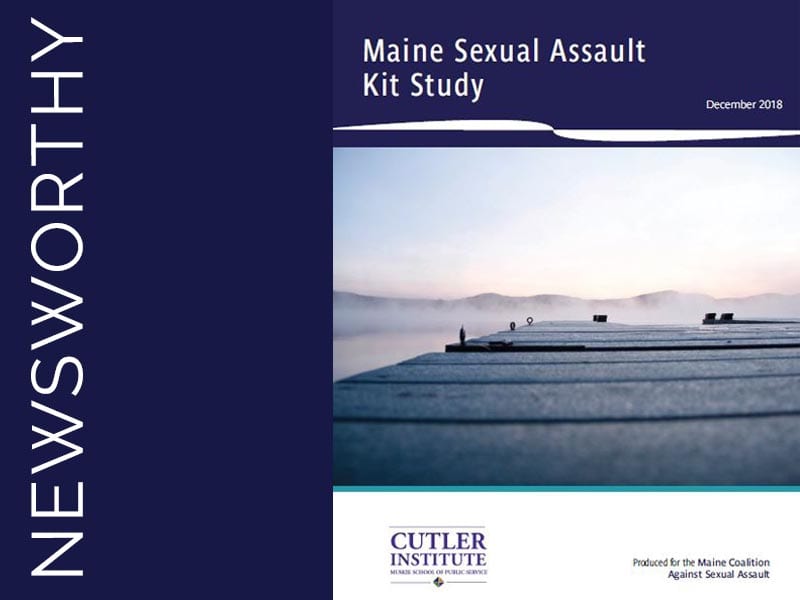A report on the use of sexual assault kits in Maine, by the University of Southern Maine’s Cutler Institute for Health and Social Policy on behalf of the Maine Coalition Against Sexual Assault (MECASA), has received the Douglas Yearwood National Publication Award from the Justice Research and Statistics Association (JRSA). JRSA is a national network of agencies, researchers, and practitioners dedicated to the use of nonpartisan research and analysis to inform criminal and juvenile justice decision-making.
Sexual assault kits (SAKs) are a means of collecting forensic evidence from a survivor’s body following a sexual assault. They are collected as part of a broader medical-forensic exam, wherein the survivor of such a crime can receive medical care.
In 2018, MECASA contracted with the Cutler Institute to conduct the Maine Sexual Assault Kit Study, a mixed-methods study which culminated in ten recommendations. The study found that the state has achieved key successes, particularly in the provision of victim-centered, trauma-informed care by trained Sexual Assault Forensic Examiners (SAFEs), and in the standardized practices at the Crime Lab, where SAKs are analyzed. However, the report also found that there is significant variation across the state regarding what happens to a SAK once it is collected. “In other words,” said Alison Grey, one of the report’s lead authors, “we found that whether law enforcement sent a SAK to the Crime Lab and/or to the prosecutor for review and how long it was stored looked different depending on where in Maine the crime occurred.” Research showed that decision-makers exercise discretion at many steps along the way, which potentially leaves room for bias.
Since the report’s publication, the State Legislature has enacted several reforms related to the report’s recommendations, while others have not yet been addressed. In May 2019, LD 1140 was signed into law, which requires that all alleged sexual assault cases received by law enforcement must be referred to the appropriate prosecutor within 60 days of receipt. That same month, LD 396 passed, which increases the required storage period of anonymous SAKs from 90 days to eight years. “We are so grateful for Cutler’s work on this study. It has already driven significant changes which have expanded access to justice for Maine’s survivors of sexual violence,” MECASA’s Executive Director, Elizabeth Ward Saxl said.
Still unaddressed, however, are the report’s recommendations to provide secure state funding for the Crime Lab, to develop a comprehensive tracking system, and to enhance training of law enforcement. Another recommendation, to standardize storage times for reported (non-anonymous) SAKs, has recently been the subject of a working group led by MECASA and District Attorney Andrew Robinson, of the Maine Prosecutors Association.
In addition, the study found that 78% of nurse managers and 68% of SAFEs surveyed believe there are not enough trained SAFEs or other specially trained personnel in their emergency departments to effectively meet the needs of sexual assault victims. Based on these findings, the authors recommended staffing incentives for recruitment and retentions of SAFEs and training for non-SAFE emergency department staff who may collect SAKs. A timely new initiative at UNE’s School of Nursing and Population Health, which was funded this year by the U.S. Health Resources and Services Administration (HRSA), aims to address this shortage of trained nurses and support those who are practicing throughout the state.
“We developed these recommendations based on our findings and in conversation with MECASA and key stakeholders, and we believe they offer ways to move further toward justice and well-being for survivors while effectively using limited resources,” said Erika Arthur, another of the report’s lead authors. “Sadly, sometimes research sits on the shelf; that is not the case with this report,” MECASA’s Ward Saxl added, “congratulations to the Cutler Institute for this well-deserved award.”
